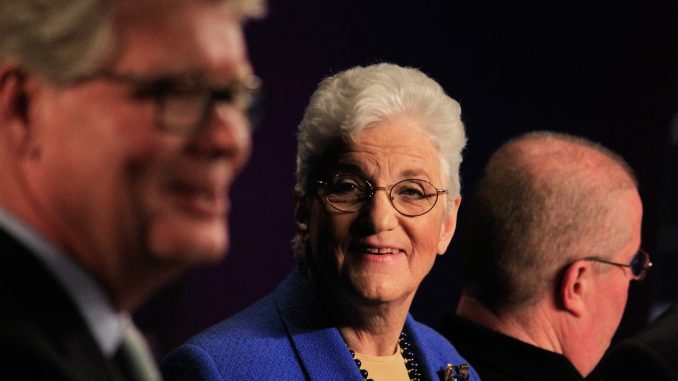
For Philadelphia’s mayoral candidates, K-12 education has been one of the hottest topics of discussion leading up to the Democratic primary election on May 19 – and many candidates think that Temple, along with other local colleges and universities, has a responsibility to help fix the issue.
Candidate Doug Oliver, the former senior vice president of Philadelphia Gas Works, said universities like Temple can directly impact the city’s school district.
“When we talk about a role that [colleges and universities] can play, it might be with respect to helping us solve our challenges for our pre-K, elementary, middle and high school system,” Oliver said following a mayoral debate held last Tuesday at the Kimmel Center.
The debate was hosted by the Greater Philadelphia Chamber of Commerce in association with NBC10 and Telemundo 62, and was moderated by Jim Rosenfield of NBC10.
The debate participants included Oliver, former Philadelphia District Attorney Lynne Abraham, former judge and current Temple trustee Nelson Diaz, former city councilman Jim Kenney, former State Sen. Milton Street and State Sen. Anthony Hardy Williams.
Like Oliver, many of the other candidates said the school district could use help from Temple and other universities. Diaz suggested Temple model a program similar to one run by Rutgers University-Camden.
However, none of them supported Mayor Michael Nutter’s proposal to increase property taxes by 9.34 percent to generate more money for public schools.
“You’re never going to fund schools through taxes,” Street said during the debate.
Williams and Kenney said they would wait on taking action until they see how much, if any, state funds new Democratic Gov. Tom Wolf can procure in Harrisburg for the Philadelphia School District.
Oliver criticized the curriculum of Philadelphia public schools, saying that the education is still geared toward agricultural and industrial jobs. He told the audience at the Perelman Theater that schools need to prepare students for the employment opportunities available.
Kenney added that Temple and other local universities also need to equip students with the skills needed to improve the city’s workforce.
“I would like to find out what business is looking to acquire in the way of personnel in the next decade,” he said after the debate. “We can work with Temple, work with the other universities, and community colleges too, to see how we can tailor the curriculum to fit those needs.”
Williams said Temple and other local colleges and universities are “essential” for economic growth.
“For the last almost half a generation or so, they are the economic engines that have grown the economy,” Williams said. “Center City is about 40-plus percent of our growth – the other parts are around the universities. They are job-creators.”
During the opening minutes of discussion about education, the debate’s focus abruptly shifted to Abraham’s health, as she collapsed to the floor. She attributed the fall to a sudden drop in blood pressure. She added that she recovered quickly, but was advised to sit out the rest of the debate.
Following her collapse and the discussion on education, the candidates shifted their focus to the city’s economy. Street said there are “two Philadelphias” – Center City and outlying neighborhoods that are struggling. Oliver said the issue is even worse than that.
“There are two cities – those who have and those who don’t,” he said.
Diaz spoke about his own rise from poverty – he said he did not sleep in a real bed until he was 10 years old.
Improving job opportunities for those stuck in poverty is also a key issue for Street, who said “we need jobs now.”
Even though the topic was the economy, candidates constantly returned back to the point of fixing education. Kenney called for universal pre-kindergarten as a way to lead children out of poverty and the need for schools to “keep young people out of trouble.”
The topic will continue to be key as Temple’s Performing Arts Center hosts a mayoral debate on May 4, before the Democratic primary election is held on May 19.
Jack Tomczuk can be reached at jack.tomczuk@temple.edu.



Be the first to comment